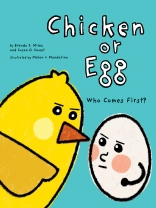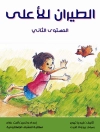Chicken and Egg are best friends who love playing together but don’t like losing. In the end, Chicken and Egg learn to appreciate having fun — no matter who wins!
With minimal words and vibrant illustrations, Chicken or Egg is a sweet and simple introduction to the concepts of good sportsmanship and losing gracefully.
Also included is a Note to Parents, Caregivers, Teachers, and Coaches with strategies to encourage children to focus on fun, not who comes first.
From the Note to Parents, Caregivers, Teachers, and Coaches:
We all feel some degree of competitiveness. It’s part of being human (or a chicken…or an egg!). And while competing for food may not be as critical now as it was before the advent of grocery stores, modern-day sporting events are big business—proof positive that our competitive spirit is thriving. Children feel competitive, too, although natural variations mean some children feel more competitive than others. That competitiveness may also appear with some playmates more than others, and siblings usually top the list!
Competitiveness itself is not a bad thing, but extreme negative reactions to loss can be disruptive and upsetting when everyone is trying to have fun. Children in particular may find losing tough. Part of the reason involves their brains, which continue to grow and develop until early adulthood. Until their brains are fully mature, children don’t think about and process things the way we do as adults. For one thing, they often engage in “all-or-none” thinking, which is more concrete or black and white than adult thought. So there are winners or losers, there is first or last, and there is good or bad with little understanding of any middle ground or more abstract concepts like luck. Children sometimes struggle to understand other people’s viewpoints, too, so they may not appreciate how a victor might feel about a tantrum displayed by an opponent. Children may also lack the vocabulary to fully express frustration, so disappointment may surface as anger or tears instead.
Learning to lose gracefully takes some time. But with support and practice, children can and do get better at it! Here are some strategies to help you get started.












